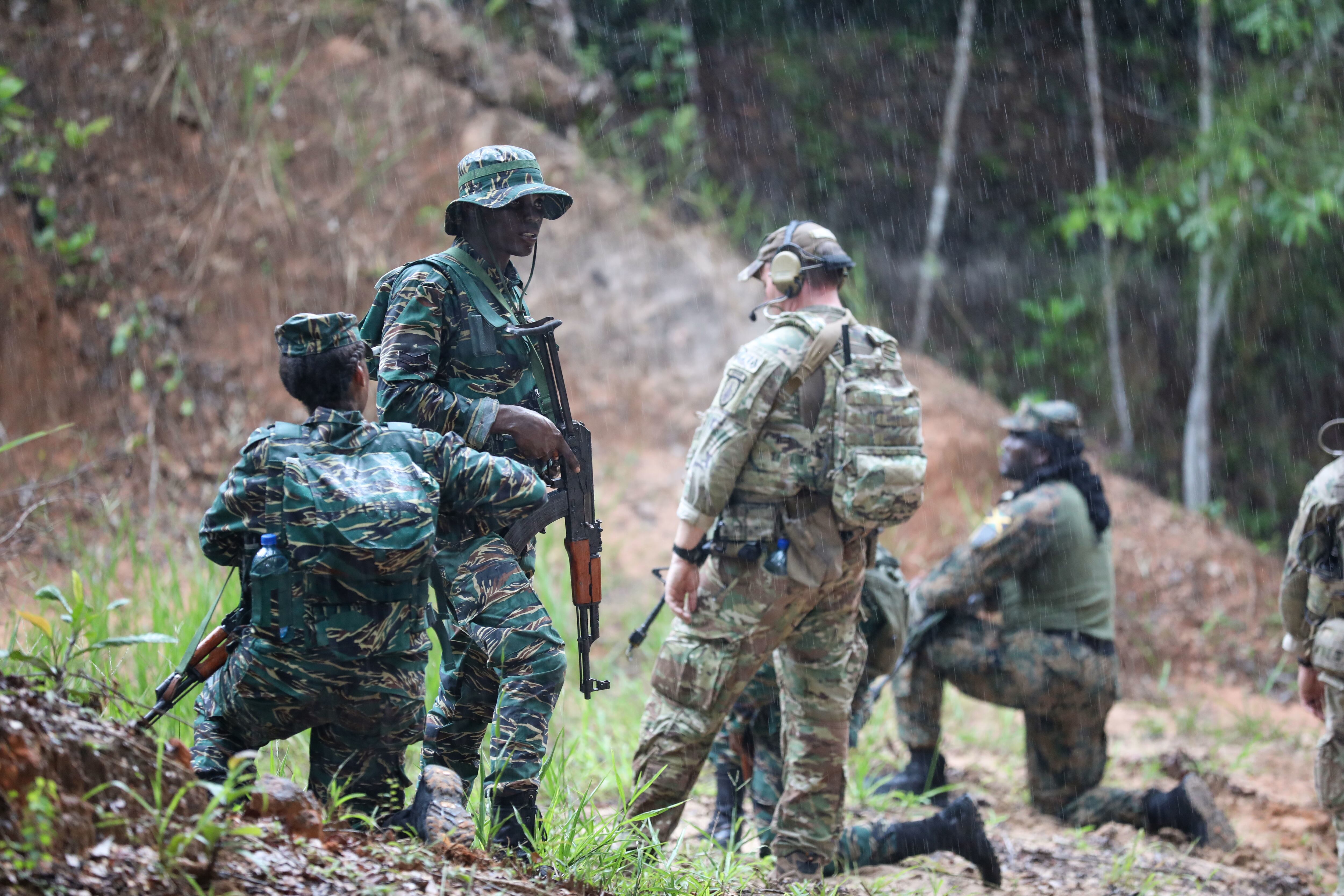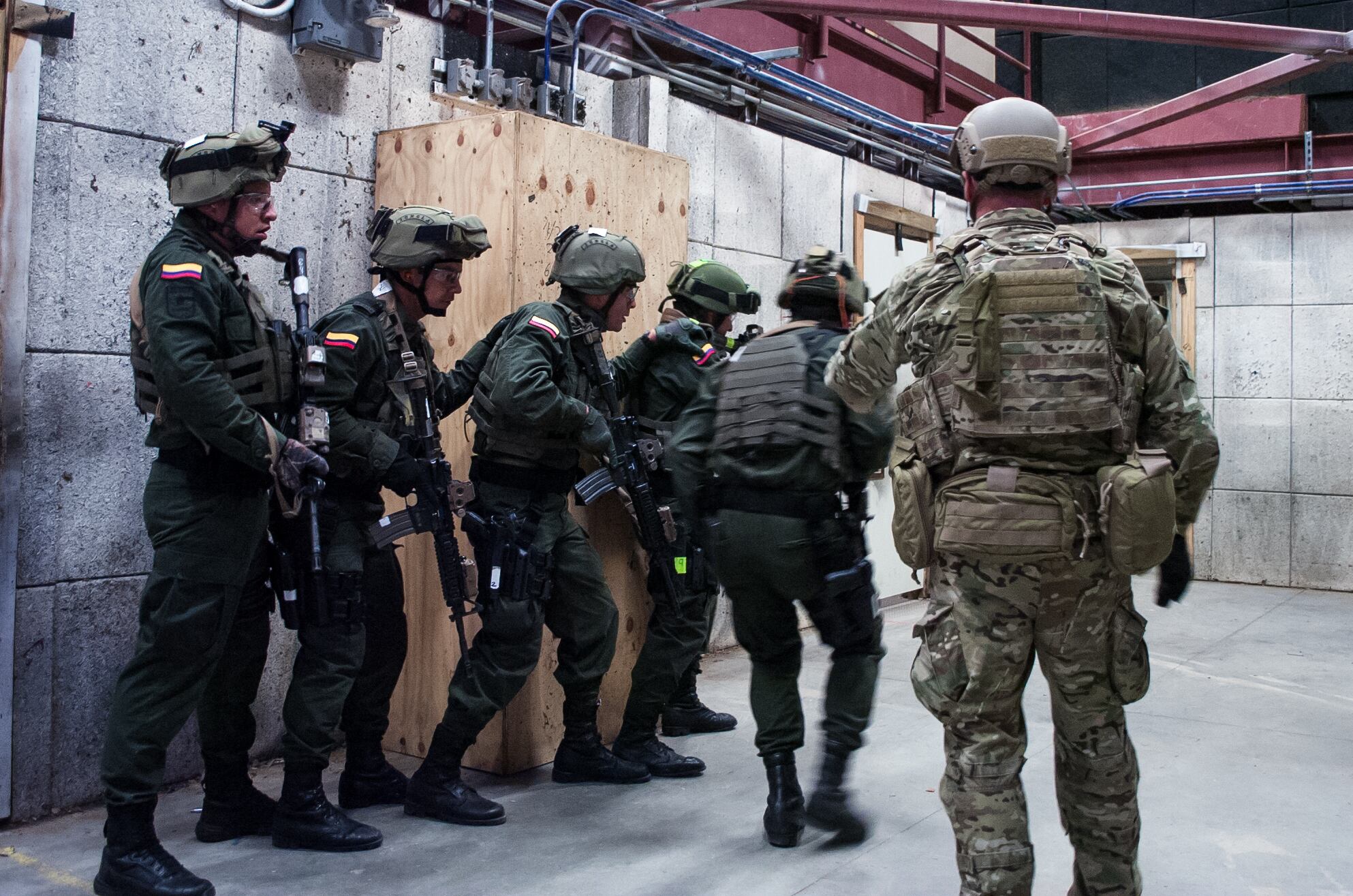TAMPA, Fla. — A number of U.S. partners in Latin America hunting down narco-terrorists and criminal gangs and countering Russian and Chinese government influence share their sensitive data and communicate through the messaging application WhatsApp.
The lead U.S. special operations general wants to change that.
There are secure communication, data analysis and software tools in widespread use across many parts of the globe to combat terrorism and track U.S. adversaries with regional partners. But those expensive tools are not an option for cash-strapped countries in Central and South America, said Rear Adm. Keith Davids, commander of Special Operations for U.S. Southern Command.
Davids had a focused audience of a few thousand vendors of such tools when he shared that information while speaking here on a panel Wednesday at the Special Operations Forces Industry Conference held by the National Defense Industrial Association.
The two-star noted 60% to 70% of the drug interdiction in the region is done by partners. But they’re able to do that because of the intelligence-sharing the United States can provide.
However, Davids said how they’re transmitting it creates vulnerabilities.
“A lot of information is shared between our partners and even law enforcement on WhatsApp,” he said. “Probably not where we want to be in the 21st century.”
He’s looking to industry for the right tool.
“Anything that is affordable and secure enough that allow me to pick up the phone and call my teammates, my foreign partners and share our security concerns could hugely enable them,” he said.
The money problem hasn’t gotten better. Davids said the economic impacts of the COVID-19 pandemic hit many South American countries disproportionally hard, and it will take years to recover.

At the same time, People’s Republic of China agents in the region are brokering deals for shipping access, fishing access and oil and minerals.
And they’re offering technology at a subsidized and steep discount, Davids said, adding that he or other officials have to tell South American countries they may not be able to share information as readily if they’re on a Chinese government network.
“I immediately get asked, ‘What’s your alternative?’” Davids said. That’s because, as his partners tell him, “a drowning man will grab a lifejacket from anybody.”
The forces need tools for a common operating picture, especially for ungoverned spaces such as shorelines, rivers or borders.
Davids called the special operators and other U.S. forces, especially those doing civil affairs and psychological operations work in the region, the “scouts” for other U.S. entities like the U.S. State Department, letting them understand better what’s going on in the region.

Army Times has reported extensively on work by the Army’s Security Force Assistance Brigades in the region.
Beginning in 2019, U.S. Southern Command began to reinvigorate military exercises with Latin American partners.
In 2018, then SOUTHCOM head Navy Adm. Kurt W. Tidd laid out five key challenges, including Iranian efforts to penetrate the region, Military Times reported.

“Hezbollah’s been there for a long time,” Tidd said at the time. They have used “large-scale criminal activity to fund terrorism in other parts of the world.”
All of this comes among concerns about potential weapons of mass destruction vulnerabilities along the U.S. southern border, ongoing drug trafficking into the United States and growing mass migration security concerns. As well as Chinese and Russian government influence in that space.
“This is a global front — what the PRC is doing,” Davids said. “They’re trying to politically isolate Taiwan.”
The Chinese government is doing that in part by chipping away at support for Taiwan in Latin America. Currently eight of 14 nations that recognize Taiwan as a country are in the region.
“What we see is the PRC is very aggressively trying to flip that,” Davids said.
They’re doing that through infrastructure funding, supply chain funding and wedging their interests on both sides of the Panama Canal. Those moves help create leverage for votes against Taiwan policies at the United Nations.
The canal produces its own set of concerns beyond politics, Davids said. He called the space a “global chokepoint” for supply chains.
“For those of you who haven’t been there and seen the never-ending line of container ships that are waiting to transit, and you think ‘how in the world am I going to find a needle in a haystack?” Davids said. “That is a really wicked problem that begs for technological solutions.”

Better data analysis tools could help with that and even with the decades-long narco-trafficking problems the region has faced.
Manpower is limited as the United States beefs up its Pacific presence, continues its counterterrorism mission in the Middle East and backs up Europe during the recent Ukraine crisis. And much of what they need to know about lies in ungoverned, unmonitored spaces, including border regions, dense jungles, rivers and shorelines.
By better structuring and sharing data, the forces in the region might better know what’s going on. Right now, that’s on the shoulders of small teams of troops, such as Green Berets working in Colombia to counter rebel groups and drug traffickers.
But it goes beyond operators helping troops gather intel better and is wedded to how the United States messages its intent and how it can help.
“Relationships are framed by history, so there are certainly some challenges to work through,” Davids said.
But the Miami, Florida native noted the shared cultural ties of democratic governance, rules of law, trade relations and economic remittances from the United States southward all bind the region together in many ways.
When trying to spread their message, Davids said it’s been more effective to work through credible local allies.
“What I’ve found in the SOUTHCOM [area of responsibility] is if it comes from the United States and it looks like a counter-PRC message, sometimes that falls on deaf ears,” he said. “So, what’s been really effective is working with our foreign partners to give them the intel and information and then they become the voice.”
While China might grab the headlines, Russia has a deeper history in the region and continues to bolster that he said. From its long ties with Cuba dating back to the island nation’s communist government origins to its current support of the regime of Venezuelan President Nicolás Maduro, Russia is a mass foreign influencer in the region.
But Russia’s approval rating dropped by 9% after its invasion of Ukraine. That gives the United States an opportunity to strengthen its ties and hopefully sway Latin American leaders leaning toward Russia.
Davids said he’d love to show partners videos of Russia’s actions and performance in Ukraine now and offer a few questions.
“That’s the military partner of choice? How’s that working out? How’s the equipment working out? How’s the tactics?” he said. “I wouldn’t want to partner with that organization.”
Todd South has written about crime, courts, government and the military for multiple publications since 2004 and was named a 2014 Pulitzer finalist for a co-written project on witness intimidation. Todd is a Marine veteran of the Iraq War.









